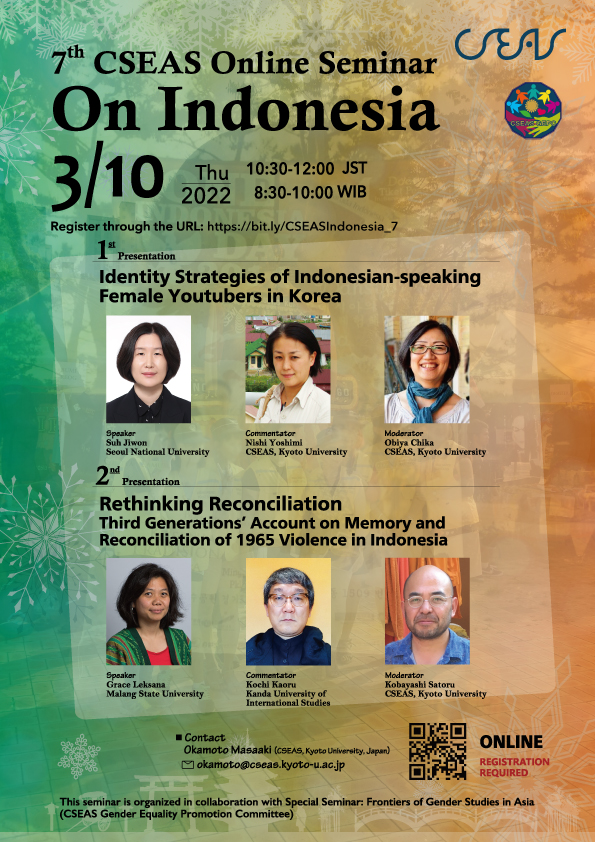You are cordially invited to our online seminar on Indonesia. The topics are the Indonesian female vloggers in South Korea and the memory and reconciliation of 1965 violence in Indonesia. This seminar is co-organized with Special Seminar: Frontiers of Gender Studies in Asia (CSEAS Gender Equality Promotion Committee)
Time and Date: 10:30 to 12:00 (Japan Time) or 08:30 to 10:00 (Indonesia Time) on March 10, 2022
Access to the Seminar: Register through the URL:
https://bit.ly/CSEASIndonesia_7
1st Presentation: Showcasing Muslim life in diaspora: Indonesian female vloggers in South Korea
Speaker: Suh Jiwon (Seoul National University)
Commentator: Nishi Yoshimi (CSEAS, Kyoto University)
Moderator: Obiya Chika (CSEAS, Kyoto University)
2nd Presentation: Rethinking Reconciliation: Third Generations’ Account on Memory and Reconciliation of 1965 Violence in Indonesia
Speaker: Grace Leksana (Malang State University)
Commentator: Kochi Kaoru (Kanda University of International Studies)
Moderator: Kobayashi Satoru (CSEAS, Kyoto University)
The presentations’ abstracts and the presenters’ bio are as follows:
Abstract of 1st Presentation:
As vlogging becomes popular, more and more Indonesian vloggers are showcasing their lives abroad online. What do the vloggers choose to communicate from their lives in the diaspora, and how do they narrate their gendered social roles? What is the nature of the relationship they forge with the audience? This research focuses on the ways how two married female Indonesian vloggers – Gina Selvina of the “Kimbab Family” account and Zhiee Leely – tell their stories as migrant women in South Korea in response to their mostly Indonesian viewers. Although clips covering typically Korean topics in Indonesian media, such as K-pop stars and street foods, are predictably popular, both vloggers and viewers also show a deep concern for maintaining Islamic lifestyle and traditions of tanah air as a minority group in the host society. When it comes to the matter of mothering, the viewers tend to support and affirm the vloggers’ practices, rather than functioning as police of morality. In sum, vlogging can work as a dialogue between women in diaspora and an audience generally supportive of women’s experiences and take them as inspirational tales.
Abstract of 2nd Presentation:
In Indonesia, the case of anti-communist violence in 1965 is a complex topic to discuss. During the authoritarian regime of Suharto (1966-1998), discourse about the violence has been largely repressed and excluded from the national historiography. When the regime ended, narratives of violence began to appear in public through victims’ accounts and the rise of transitional justice movements. However, this transformation did not necessarily lead to a promising future of justice and reconciliation for the case of 1965 violence. The International People’s Tribunal of 1965 in 2015 and the National Symposium on 1965 in 2016 did not resulted in a significant follow up towards reconciliation, even though results of both events have pointed to the importance of resolving the violence. In this seminar, I will take a different approach from the legal framework of human rights in the case of 1965. For the past 10 years, Indonesia has experienced the rise of third generations and young people who have been using various media to raise the issue of 1965. These groups consist of youths who are the descendants of victims or those who do not have direct experiences with 1965 but were triggered by the continuous mistreatment against the victims. Media such as podcasts, art exhibitions, and other digital platforms, are used to publish the narratives of violence. I will specifically focus on three artists that talk about 1965 in their works. They not only convey memories on the 1965 violence, but also interpreting forms of reconciliation and the representation of violence. What does reconciliation mean in the forms of everyday life? Who are involved in this process? To what extent does the distinction between victims and perpetrators are still relevant in the process of cultural reconciliation? How is violence depicted in these works? Through these questions, we will zoom in to the complexity of reconciliation of 1965 violence, which tends to be glosses over by the state-centric approach.
Bio of the 1st Presenters:
Suh Jiwon (suhjiwon[at]gmail.com) is an associate professor at Seoul National University, South Korea. She received her PhD from Ohio State University. It is about the politics of transitional justice in post-Suharto Indonesia. Her main works are on the justice and transitional justice issues, and she writes articles on the topics in various journals such as “Plural Justice: Indonesian Norm Entrepreneurs and Models of Justice.” South East Asia Research 27:2. And she translated Anderson’s book Imagined Communities: Reflections on the Origin and Spread of Nationalism in Korean and also wrote a book on Benedict Anderson in 2018.
Bio of the 2nd Presenter:
Grace Leksana (grace.leksana.fis[at]um.ac.id) is a lecturer at Malang State University, Indonesia. She obtained her PhD from Leiden University. Her works involves collective memory, oral history, anti-communist persecution, rural politics, and decolonization. Her manuscript Embedded Remembering: Memory Culture of 1965 Violence in Rural East Java will be published by Amsterdam University Press. She is now working on a new project on history of citizenship with a focus on (ex-colonial) plantation society in the Southern part of East Java.
Contact: Okamoto Masaaki (okamoto[at]cseas.kyoto-u.ac.jp)(CSEAS, Kyoto Univeristy, Japan)
